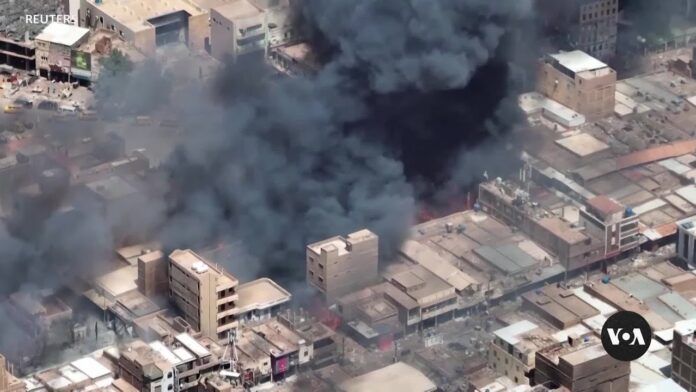Sudanese journalist provides a poignant eyewitness account of the ongoing civil strife tearing apart her homeland, as the international community remains largely unresponsive
The ongoing conflict in Sudan, which erupted over disputes between top military leaders, has plunged the nation into a dire humanitarian crisis, marking a grim anniversary as described by Zeinab Mohammed Salih, a Sudanese journalist based in Omdurman. Reflecting on a year of relentless violence, Salih offers a personal narrative that brings to light the profound suffering and disruption inflicted upon countless lives.
Before the conflict escalated, Omdurman was a bustling, tightly-knit community. Now, it lies eerily silent, save for the occasional roar of military aircraft and the chaos of ground skirmishes. Salih recounts the distressing transformation of her neighbourhood and the tragic toll on her friends and family, many of whom have either fled or been caught in the crossfire.
The conflict, which started precisely a year ago, was ignited by a power struggle between Sudan’s two leading military figures following a joint coup in 2021. The ensuing war has not only led to widespread death and injury but also a breakdown of basic social structures. Residents live in constant fear of the next attack and the potential looting by armed factions that follow.
On a personal note, Salih shares her harrowing experiences of the war’s impact on her daily life. She has been unable to return home, receiving reports that her house has been stripped bare by looters. The scarcity of food and medical aid has become the norm, not the exception, with many like her grandmother, who suffered from diabetes, dying due to lack of treatment.
The epicentre of the conflict has shifted over the months, with Darfur witnessing some of the most severe atrocities, including ethnically targeted killings and sexual violence. The situation in Darfur has deteriorated, with Salih documenting the aftermath of mass killings in cities like Geneina, where over 10,000 people were reportedly killed in just two massacres according to the UN.
Despite her role as a journalist, Salih admits the emotional toll the coverage takes on her, struggling with the trauma of what she has witnessed. She calls on the international community to intervene and exert pressure on the warring factions and their regional backers to bring an end to the violence.
As the conflict in Sudan reaches its one-year mark, the situation remains bleak, with a looming famine and the increasing militarization of civilians threatening to exacerbate the already catastrophic conditions. Salih’s account is a stark reminder of the human cost of conflict and the urgent need for a concerted international response to prevent further tragedy in Sudan.
